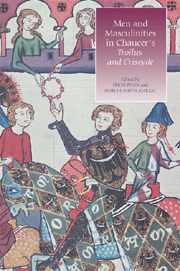Book contents
- Frontmatter
- Contents
- Contributors
- Abbreviations
- Introduction: The Myths of Masculinity in Chaucer's Troilus and Criseyde
- 1 “Beautiful as Troilus”: Richard II, Chaucer's Troilus, and Figures of (Un)Masculinity
- 2 The State of Exception and Sovereign Masculinity in Troilus and Criseyde
- 3 Revisiting Troilus's Faint
- 4 What Makes a Man? Troilus, Hector, and the Masculinities of Courtly love
- 5 Masculinity and Its Hydraulic Semiotics in Chaucer's Troilus and Criseyde
- 6 Masochism, Masculinity, and the Pleasures of Troilus
- 7 “The Dreams in Which I'm Dying”: Sublimation and Unstable Masculinities in Troilus and Criseyde
- 8 “A Mannes Game”: Criseyde's Masculinity in Troilus and Criseyde
- 9 Troilus's Gaze and the Collapse of Masculinity in Romance
- 10 Sutured Looks and Homoeroticism: Reading Troilus and Pandarus Cinematically
- 11 Being a Man in Piers Plowman and Troilus and Criseyde
- 12 “The Monstruosity in Love”: Sexual Division in Chaucer and Shakespeare
- Index
- CHAUCER STUDIES
2 - The State of Exception and Sovereign Masculinity in Troilus and Criseyde
Published online by Cambridge University Press: 12 September 2012
- Frontmatter
- Contents
- Contributors
- Abbreviations
- Introduction: The Myths of Masculinity in Chaucer's Troilus and Criseyde
- 1 “Beautiful as Troilus”: Richard II, Chaucer's Troilus, and Figures of (Un)Masculinity
- 2 The State of Exception and Sovereign Masculinity in Troilus and Criseyde
- 3 Revisiting Troilus's Faint
- 4 What Makes a Man? Troilus, Hector, and the Masculinities of Courtly love
- 5 Masculinity and Its Hydraulic Semiotics in Chaucer's Troilus and Criseyde
- 6 Masochism, Masculinity, and the Pleasures of Troilus
- 7 “The Dreams in Which I'm Dying”: Sublimation and Unstable Masculinities in Troilus and Criseyde
- 8 “A Mannes Game”: Criseyde's Masculinity in Troilus and Criseyde
- 9 Troilus's Gaze and the Collapse of Masculinity in Romance
- 10 Sutured Looks and Homoeroticism: Reading Troilus and Pandarus Cinematically
- 11 Being a Man in Piers Plowman and Troilus and Criseyde
- 12 “The Monstruosity in Love”: Sexual Division in Chaucer and Shakespeare
- Index
- CHAUCER STUDIES
Summary
Troilus and Criseyde, though one of Chaucer's most overtly political texts, nevertheless leaves an unanswered political question at the heart of its plot: where can sovereignty be located in this romance?
Its characters variously attribute a metaphorical sovereignty to personified abstract forces such as love, fortune, and providence: “thilke sovereyne purveyaunce / That forwoot al withouten ignoraunce” (4.1070–71). The two lovers also claim to treat Criseyde's desires as sovereign within the context of their love relationship: “‘O my Criseyde, O lady sovereigne’” (4.316), says Troilus, and Criseyde too reserves decisions about sovereignty to herself: “‘A kynges sone although ye be, ywys, / Ye shal namore han sovereignete / Of me in love, than right in that cas is’” (3.170–72).
These metaphorical invocations exhaust the occurrences of the terms “sovereign” and “sovereignty” in Troilus and Criseyde. Literal political sovereignty in wartime Troy is thus more difficult to pin down precisely. Does it rest with King Priam, the titular sovereign, but one who remains a shadowy background figure? Does it rest with his eldest son Hector, to whom matters of state are normally referred in the course of the romance? Does it rest with the Trojan council or “parliament” that collectively overrules Hector and chooses to exchange Criseyde for Antenor in Book 4? Or is sovereignty in Troilus and Criseyde less an absolute power residing in any one individual or political body than a more diffuse system of relations? In this essay I examine the latter possibility, and suggest some ways in which these power relations are gendered, as well as some of the ways in which Chaucer critiques the gendering of power.
- Type
- Chapter
- Information
- Publisher: Boydell & BrewerPrint publication year: 2008

